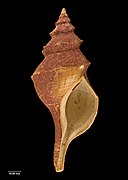Penion cuvierianus
| Penion cuvierianus Temporal range: Early Pliocene to Recent,
| |
|---|---|

| |
| Dorsal view of a shell of Penion cuvierianus | |
| Scientific classification | |
| Domain: | Eukaryota |
| Kingdom: | Animalia |
| Phylum: | Mollusca |
| Class: | Gastropoda |
| Subclass: | Caenogastropoda |
| Order: | Neogastropoda |
| Family: | Austrosiphonidae |
| Genus: | Penion |
| Species: | P. cuvierianus
|
| Binomial name | |
| Penion cuvierianus (Powell, 1927)
| |
| Synonyms | |
| |
Penion cuvierianus is a species of very large predatory sea snail or whelk, commonly called the flaring penion, a marine gastropod mollusc in the family Austrosiphonidae.[1]
Description[edit]
Penion cuvierianus is a very large species of siphon whelk.[2][3] Shells vary between ivory and yellow in colouration.[3]
Recent genetic and geometric morphometric research using shell shape and size has demonstrated that a formerly recognised subspecies Penion cuvierianus jeakingsi is closely related to Penion ormesi, instead of Penion curierianus, and the taxon has been synonymised with P. ormesi.[4]
Distribution[edit]
Penion cuvierianus is endemic to New Zealand.[2][3] The taxonomic name is a reference to the type locality of Cuvier Island.[2] The species has an abundant fossil record in the North Island of New Zealand.[5]
The species occurs in the subtidal zone between depths of 20 and 200 metres.[3]
Subspecies[edit]
These subspecies have been recognised:
Subspecies brought into synonymy[edit]
- Penion cuvierianus jeakingsi (Powell, 1947):[2] synonym of Penion ormesi (Powell, 1927)[4]
References[edit]
- ^ Kantor, Yuri I.; Fedosov, Alexander E.; Kosyan, Alisa R.; Puillandre, Nicolas; Sorokin, Pavel A.; Kano, Yasunori; Clark, Roger; Bouchet, Philippe (2022). "Molecular phylogeny and revised classification of the Buccinoidea (Neogastropoda)". Zoological Journal of the Linnean Society. 194 (3): 789–857. doi:10.1093/zoolinnean/zlab031.
- ^ a b c d e Powell A. W. B., New Zealand Mollusca, William Collins Publishers Ltd, Auckland, New Zealand 1979 ISBN 0-00-216906-1
- ^ a b c d Willan, R.C., de C. Cook, S., Spencer, H.G., Creese, R.G., O’Shea, S., Jackson, G.D. Phylum Mollusca. In: de C. Cook, S.C. (eds.), New Zealand Coastal Marine Invertebrates 1, 406 – 407. Canterbury University Press, Christchurch, New Zealand ISBN 978-1877257-60-5
- ^ a b Vaux, Felix; Gemmell, Michael R.; Hills, Simon F.K.; Marshall, Bruce A.; Beu, Alan G.; Crampton, James S.; Trewick, Steven A.; Morgan-Richards, Mary (2020). "Lineage Identification Affects Estimates of Evolutionary Mode in Marine Snails". Systematic Biology. 69 (6): 1106–1121. doi:10.1093/sysbio/syaa018. PMID 32163159.
- ^ a b Beu, Alan G.; Maxwell, P.A. (1990). Cenozoic Mollusca of New Zealand. New Zealand Geological Survey Bulletin. Vol. 58. Lower Hutt, New Zealand: New Zealand Department of Scientific and Industrial Research. ISSN 0114-2283.




